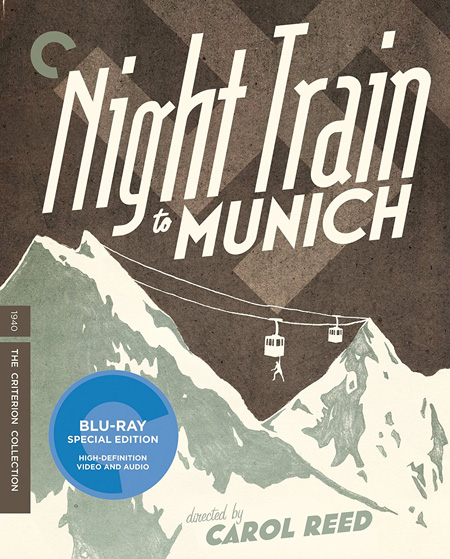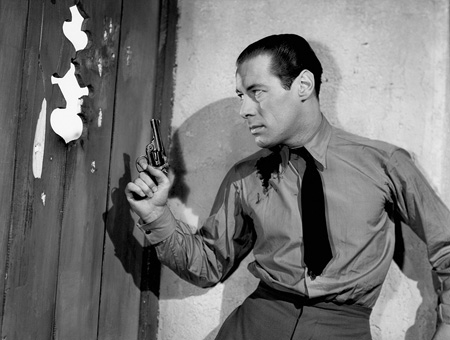
RETRO-ACTIVE: THE BEST FROM THE CINEMA RETRO ARCHIVES
“THE LADY VANISHES
ONE MORE TIMEâ€
BY RAYMOND BENSON
The
Criterion Collection has issued a Blu-ray upgrade to a previous winning DVD
release—Carol Reed’s World War II suspense adventure, Night Train to Munich. It’s a terrific example of the fine cinema
Britain was managing to produce even while at war. Released there in August of 1940, the country
was already in the conflict, although the Blitz had not yet occurred. (The picture was released in the U.S. in
December 1940, smack dab in the middle of
the Blitz.)
What’s
more striking is its resemblance to Alfred Hitchcock’s The Lady Vanishes (1938) in tone, setting, and even characters.
Marketing pushes at the time suggested that Night
Train to Munich was a “sequel†to Vanishes,
which was an extremely popular movie on both sides of the Atlantic. Night Train is not a sequel, though—it’s
more of a remake.
Somebody
at the studio must have thought they needed “another movie like Lady Vanishes†so writers Sidney Gilliat
and Frank Launder, who were responsible for the previous screenplay, were
secured to pen the new one. Both pictures have plots that involve spies, double
agents and Nazis, and a major portion of the stories takes place on a passenger
train. To sell the “sequel†concept even more to the public, popular actress Margaret
Lockwood, the star of Vanishes, was
cast as the lead, this time opposite a young Rex Harrison instead of Michael
Redgrave. Most curious, though, is the inclusion of two characters (and the actors who played them) from Vanishes—the duo of the very British,
comical, possibly gay men known as Charters and Caldicott (played by Basil
Radford and Naunton Wayne). The couple was such a hit the first time around,
the two fellows had to be passengers on board Night Train, too. There has
been much discussion about Charters and Caldicott’s sexual orientation since
their several appearances in these and a few other films of the late thirties
and early forties. Are they gay? There are certainly several humorous “clues†in these
two first titles to suggest it. Since something like that couldn’t be blatantly
talked about in those days, it was best for the audience to simply find it
funny that two men are traveling together (again, on a train?) and possibly
using the same bed (in Vanishes).
In
Night Train, Lockwood plays the
daughter of a Czech scientist who is the MacGuffin of the story—both the Allies
and the Nazis want him. When father and daughter are captured and held in
Berlin, Harrison, a British agent whose cover is to perform and sell sheet
music in an English seaside town, is sent to Germany to free and bring them back
to the U.K. He impersonates a Nazi major in order to get “inside,†and his
impromptu escape plan involves the boarding of a train traveling from Berlin to
Munich (with fellow passengers Charters and Caldicott willing to help!). In the
meantime, a Nazi captain played by Paul Henreid (here credited as Paul von
Henreid—before he moved to Hollywood to be in Casablanca) is dedicated to keeping the scientist and his daughter
under the thumb of the Reich. Never mind that both Harrison and Henreid are
both in love with Lockwood.

Sounds
pretty far-fetched, doesn’t it? Forget it—this is a fast-paced,
intelligently-written, well-acted, and suspenseful adventure film. Mixed in
with all the excitement is light humor, in the tradition of Hitchcock’s
picture, thus providing viewers with an entertaining ride. Reed, who would go
on to make other classic British thrillers such as Odd Man Out and The Third Man,
handles the material with panache and style—just as Hitchcock did—but with a
more personal, friendlier touch.
The
new disk comes with a restored, high-definition digital transfer, with an
uncompressed monaural soundtrack. The image is remarkably clear and sharp, a
testament to the outstanding job Criterion does in presenting vintage cinema.
Supplements include a fascinating 2010 conversation between film scholars Peter
Evans and Bruce Babington about the director, writers, and the socio-political
climate at the time the picture was made, and an essay in the booklet by film
critic Philip Kemp.
So
“All aboard!†and take another ride on the thriller-adventure train. It doesn’t
matter if you don’t know The Lady
Vanishes—Night Train to Munich stands
on its own as top notch filmmaking. Better yet, get them both and make it a
double feature!
CLICK HERE TO ORDER FROM AMAZON